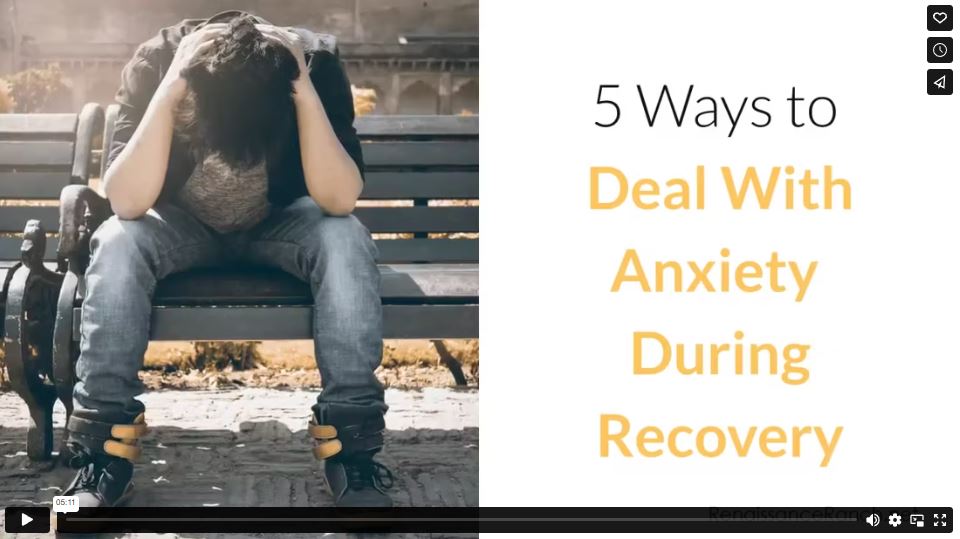You’re used to that feeling – your chest tightens, you’re having trouble breathing, and you feel trapped and scared. In the past, it was a drink or a hit that provided a temporary escape from your anxiety. But that respite was short-lived and came at a tremendous cost – one that you don’t want to pay ever again. Now that you’re committed to staying sober, how do you manage the anxiety when it surfaces?
Our substance abuse rehab counselors, many of whom are on their own addiction recovery journey, came up with some suggestions. Here are five of the main ones:

(brenkee / pixabay)
1. Get a Good Night’s Sleep
Ensuring you get your seven to nine hours of quality sleep each night is not to be underestimated as a critical factor in managing anxiety. Quality sleep increases immune function and energy levels, enhances brain performance, and improves mental and physical health, to name a few things. On the flip side, lack of sleep and poor sleep can cause brain dysfunction that actually worsens anxiety. You can make good sleep a priority by using room-darkening curtains, keeping your bedroom temperature cool (between 60-67 degrees Fahrenheit), and eliminating screen time an hour before bed.
2. Meditate Daily and Consider Yoga
Taking time to meditate is transformative, both physically and spiritually, and you don’t have to have any fancy accouterments to start. You just need a quiet place where you can be undisturbed for a few minutes each day to center yourself. If you have a smartphone, you can use several excellent free and paid apps to meditate, such as Insight Timer, Calm, INSCAPE, and Headspace.
Yoga is another excellent option for overall physical and mental relaxation. A 2020 study looked at two groups of people for 30 days, one that practiced an 11-minute Yoga Nidra exercise daily and another that did not engage in any form of meditation. Yoga Nidra is a technique where you wash awareness through the body, one body part at a time, much like a body scan. This method includes visualization and intention setting. Not surprisingly, the meditation group showed lower stress levels, higher well-being, and improved sleep over the non-meditation group at the end of the trial period.
Yoga’s physical poses also help relieve tension and pain and enhance flexibility. This kind of physical exercise promotes mood-boosting endorphins that positively affect how you handle stress and anxiety.
3. Talk with a Trusted Friend
It’s important to talk with someone and share your feelings of anxiety when they come up. There’s nothing worse than trying to bury your anxiety or pretend it’s not there. You can arrange to have a few good friends on speed-dial just for those times when you’re feeling overwhelmed and anxious. Or you can attend a 12-Step meeting and draw strength and peace from sharing with people who are experiencing similar feelings.
4. Use Grounding Exercises
By using different grounding exercises, you are giving yourself the tools to get out of your own head and escape the anxiety loop in which you are stuck. One of these exercises is Box Breathing. Begin by exhaling and expelling all the air out of your lungs. Then, inhale through your nose for a slow count of four. Hold your breath while you count to four again. Next, exhale out of your mouth for four seconds, and finally, hold your breath to the count of four. Repeat the process until you have brought your breathing and heart rate back to normal.
Another exercise is Anxiety 5-4-3-2-1:
First, name five things you can physically see. Second, list four things around you that you can touch. Third, point out three things you can hear (externally, not internally). Fourth, list two things you can smell. And fifth, name one thing around you that you can taste. With this exercise, you are shifting your focus from anxiety-producing thoughts to curiosity about the sensations you’re experiencing, thus encouraging a change in the way your brain responds to stress.
5. Distract Yourself with Healthy Habits
Engaging in an activity that will keep your heart and mind occupied until your anxiety passes is a good thing. Throw yourself into learning a new sport or hobby, attend a theater production, or get lost in a good book; these are all healthy distractions from your anxiety. Do not confuse distraction with avoidance, though. It’s essential to take the time to address your anxious feelings, uncover why they are happening, and explore ways to prevent them.
While this list of anxiety-easing suggestions can be beneficial, it’s by no means exhaustive. Medication can also play an important role in reducing anxiety, and it can be a powerful tool in your arsenal. We recommend talking with your doctor or an addiction recovery center counselor near you for additional information.
Video

